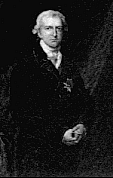 Robert Banks Jenkinson, second Earl of Liverpool, was born on 7 June 1770 in London. He was educated at Charterhouse and Oxford. In 1789 he witnessed the fall of the Bastille in Paris. He entered the House of Commons in 1790 and soon became a leading Tory, serving as
Robert Banks Jenkinson, second Earl of Liverpool, was born on 7 June 1770 in London. He was educated at Charterhouse and Oxford. In 1789 he witnessed the fall of the Bastille in Paris. He entered the House of Commons in 1790 and soon became a leading Tory, serving as
- a member of the Board of Control for India (1793-96)
- Master of the Royal Mint (1799-1801)
- Foreign Secretary (1801-04)
- Home Secretary (1804-06, 1807-09)
- Secretary for War and the Colonies (1809-12)
It was as Foreign Secretary that Liverpool negotiated the short-lived Treaty of Amiens, which was signed on 27 March 1802 with Napoleonic France.
On 11 May 1812 Spencer Perceval, the Prime Minister, was assassinated. George, the Prince Regent, sought a new PM but the first four men whom he attempted to appoint were unable to form ministries. Liverpool was the king's fifth choice of Prime Minister. Liverpool reluctantly accepted office on 8 June 1812, hoping to find and train a more brilliant successor. He served until 17 February 1827. During his long tenure of office, he allowed his Cabinet ministers to conduct their duties without overdue interference. Consequently, Liverpool's role has been minimised by historians although the mediatory role of Liverpool was crucial in holding together his ministry.
The War of 1812 with the United States and the final campaigns of the Napoleonic Wars were fought during Liverpool's premiership. At the Congress of Vienna (1814-15), he urged the international abolition of the slave trade; within a few years the other European powers accepted this view. In 1819 he strengthened the British monetary system by restoring the gold standard. Throughout his tenure he insisted that ecclesiastical and other appointments be justified by merit rather than by influence. His attitude toward civil disturbances following industrial and agricultural failures was less enlightened: he suspended Habeas Corpus for Great Britain in 1817 and for Ireland in 1822 and imposed other repressive measures such as the Six Acts in 1819 following the Peterloo Massacre. His position on proposals to repeal the Corn Laws and to grant political rights to Roman Catholics was equivocal.
Liverpool was a conscientious and capable PM who succeeded in uniting the old Pittite forces and bringing together well-established and experienced men such as George Canning, Viscount Castlereagh and the Duke of Wellington. He also encouraged bright young men with a future: men like Palmerston, Peel and Huskisson. Liverpool possessed the right blend of qualities to act as a mediator and a reconciler both of men and ideas. His contemporaries stressed his integrity, honesty, fairness and kindness. Liverpool was both respectable and tolerant of opposing points of view.
After nearly 15 years in office, he was forced to retire because of a paralytic stroke. He died on 4 December 1828 at Coombe House, Kingston upon Thames.

Last modified April 1997.